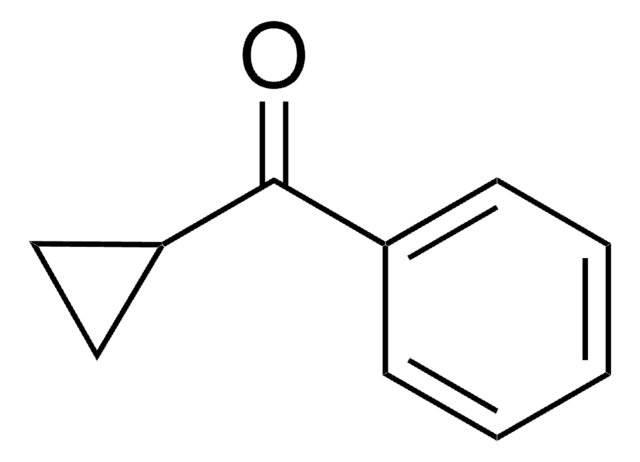All Photos(1)
About This Item
Linear Formula:
(CH3)3CCH(C6H5)OH
CAS Number:
Molecular Weight:
164.24
MDL number:
UNSPSC Code:
12352100
PubChem Substance ID:
NACRES:
NA.22
Recommended Products
assay
99%
bp
90 °C/5 mmHg (lit.)
mp
43-45 °C (lit.)
SMILES string
CC(C)(C)C(O)c1ccccc1
InChI
1S/C11H16O/c1-11(2,3)10(12)9-7-5-4-6-8-9/h4-8,10,12H,1-3H3
InChI key
YBVRFTBNIZWMSK-UHFFFAOYSA-N
General description
Raney nickel and Raney cobalt catalyzed transfer hydrogenolysis of 2,2-dimethyl-1-phenyl-1-propanol has been reported. Kinetic resolution of 2,2-dimethyl-1-phenyl-1-propanol using a lead dioxide anode modified with poly-S-valine grafted on to a polypyrrole film has been reported. An efficient Cu(I)-catalyzed oxidation of 2,2-dimethyl-1-phenyl-1-propanol with di-tert-butyldiaziridinone as oxidant under mild conditions has been investigated.
Application
2,2-Dimethyl-1-phenyl-1-propanol was used in the preparation of 2,2-dimethylpropiophenone.
Storage Class
11 - Combustible Solids
wgk_germany
WGK 3
flash_point_f
206.6 °F - closed cup
flash_point_c
97.00 °C - closed cup
ppe
Eyeshields, Gloves, type N95 (US)
Certificates of Analysis (COA)
Search for Certificates of Analysis (COA) by entering the products Lot/Batch Number. Lot and Batch Numbers can be found on a product’s label following the words ‘Lot’ or ‘Batch’.
Already Own This Product?
Find documentation for the products that you have recently purchased in the Document Library.
Transfer hydrogenolysis of aromatic alcohols using Raney catalysts and 2-propanol.
Gross BH, et al.
Applied Catalysis A: General, 219(1), 281-289 (2001)
Brant Landers et al.
The Journal of organic chemistry, 76(5), 1390-1397 (2011-01-22)
The use of commercially available (SIPr)Pd(cinnamyl)Cl (SIPr = 1,3-bis(2,6-diisopropylphenyl)-4,5-dihydroimidazol-2-ylidene) as a precatalyst for the anaerobic oxidation of secondary alcohols is described. The use of this complex allows for a drastic reduction in the reaction times and catalyst loading when compared
Poly (pyrroles) containing chiral side chains: effect of substituents on the chiral recognition in the doped as well as in the undoped state of the polymer film.
Pleus S and Schulte B.
Journal of Solid State Electrochemistry, 5(7-8), 522-520 (2001)
Yingguang Zhu et al.
Organic letters, 15(5), 992-995 (2013-02-19)
A novel and efficient Cu(I)-catalyzed oxidation of alcohols has been achieved with di-tert-butyldiaziridinone as the oxidant under mild conditions. A wide variety of primary and secondary alcohols with various functional groups can be oxidized to aldehydes and ketones in high
Our team of scientists has experience in all areas of research including Life Science, Material Science, Chemical Synthesis, Chromatography, Analytical and many others.
Contact Technical Service








